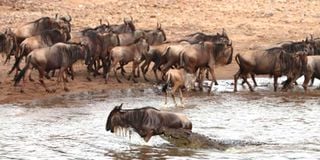Premium
Magic of the Mara Triangle

A wildebeest struggles to free itself from the jaws of a crocodile in the Mara River.
Along a steep stretch of the Mara River, a cluster of still wildebeest and zebras gaze down at the shallow water below. Beneath them, a bloat of hippos splash and snort, and enormous crocodiles bask on the surrounding sandbanks.
As others begin to lose their nerve and turn away from the river, a brave wildebeest edges down a well-worn path towards the water’s edge. He takes a few tentative steps and then leaps across the river, jolting the rest of the herd into a frenzy.
As the wildebeest stream down the river bank, the crocodiles slide silently into the water. We watch the snout of the biggest croc float towards the head of the crossing and then snap open onto the rump of a young zebra. The zebra wriggles free, but scrambles up the bank with a deep gash on its back leg. The croc then grabs hold of a wildebeest and pulls it into deeper water. Somehow after an exhausting struggle, the wildebeest also breaks free, and gets a spontaneous cheer from all of us watching this wild show on either side of the river.
Over the course of the migration season, many wildebeest won’t be so lucky. On average, of the 1.5 million that trek into the Mara from the Serengeti each year, 300,000 die. Such loss seems senseless as you watch them risk their lives to get from one perfectly-fine-looking patch of grass to another. But even those that don’t make it through the season influence the Mara ecosystem long after the dust settles. Their carcasses nourish the fish and micro-organisms in the rivers and provide nutrients for the land where they decompose.
With the rest of the herd now safely across the river, we drive west towards the heart of the Mara Triangle. It soon becomes clear what is attracting the wildebeest to this corner of the Mara: vast swathes of fresh green grass – the result of controlled fires from earlier in the year. Fire is an integral component of this landscape; it can be a useful tool to burn away grass and bush and to stimulate fresh growth for improved grazing.
We leave the main road and follow a rough two-track into a lush valley, where thousands of wildebeest grunt and graze as far as the eye can see. Dozens of vultures squabble over the scraps of an unfortunate creature in the grass nearby, while others pack the branches of the few trees poking out of the plains. We spot a couple of safari vehicles within a dense thicket in the distance and head over to investigate. They’ve found a big male leopard up a tree resting beside the dangling carcass of an impala.
Satisfied after another successful game drive, we return to our base for our trip, the Mara Serena Safari Lodge. Few wild spaces can rival the Mara Triangle for its density of wildlife and stunning landscapes, and the Mara Serena is perfectly positioned to explore it.
The lodge is perched high on a wooded hill with long views of the plains and the tree-lined bends of the Mara River. Portly warthogs are frequently shooed out of the flowerbeds by staff, while agama lizards and rock hyraxes scurry and hop across the roofs of the rooms – designed with inspiration from the traditional manyattas of the Maasai. The lodge’s unique architecture helps it stay hidden, despite its commanding position on the hill and provides an interesting interior of curved walls and traditional Maasai ornaments.
After a brief Covid closure in 2020, it’s also fantastic to see the lodge full of local and international tourists enjoying the return of the migration. And, like the wildebeest from the Serengeti, the visitors should continue to arrive long into the season.
To book your own stay at the Mara Serena Safari Lodge, head to www.serenahotels.com/mara.
Email: [email protected]





